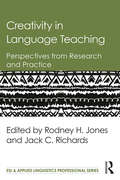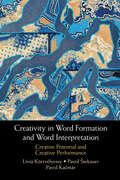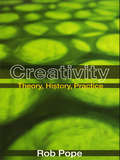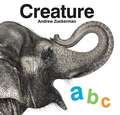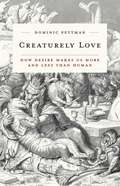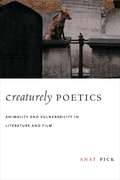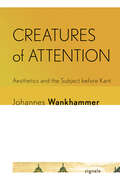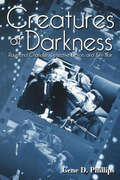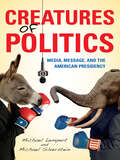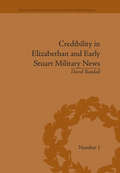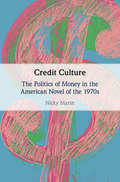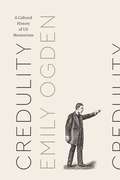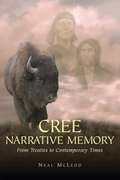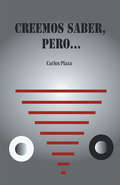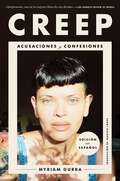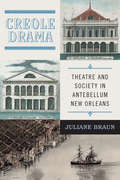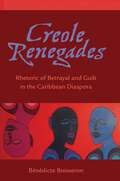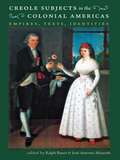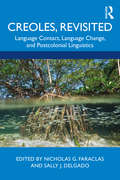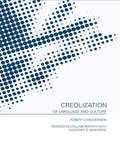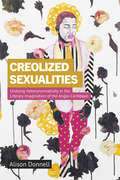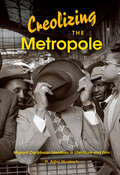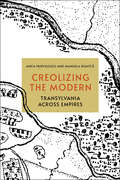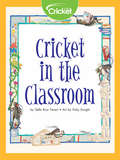- Table View
- List View
Creativity in Language Teaching: Perspectives from Research and Practice (ESL & Applied Linguistics Professional Series)
by Jack C. Richards Rodney H. JonesCurrent, comprehensive, and authoritative, this text gives language teachers and researchers, both a set of conceptual tools with which to think and talk about creativity in language teaching and a wealth of practical advice about principles and practices that can be applied to making their lessons more creative. Providing an overview of the nature of creativity and its role in second language education, it brings together twenty prominent language teachers and researchers with expertise in different aspects of creativity and teaching contexts to present a range of theories on both creative processes and how these processes lead to creative practices in language teaching. Unique in the field, the book takes a broader and more critical look at the notion of creativity in language learning, exploring its linguistic, cognitive, sociocultural and pedagogic dimensions. Structured in four sections— theoretical perspectives, creativity in the classroom, creativity in the curriculum, and creativity in teacher development—each chapter is supplemented by Questions for Discussion and Suggestions for Further Research. Its accessible style makes the book relevant as both a course text and a resource for practicing teachers.
Creativity in Word Formation and Word Interpretation: Creative Potential and Creative Performance
by Lívia Körtvélyessy Pavol Štekauer Pavol KačmárThere are many ways in which we, as speakers, are creative in how we form and interpret new words. Working across the interfaces of psychology, linguistics, psycholinguistics, and sociolinguistics, this book presents cutting-edge interdisciplinary research, showing how we manipulate the range of linguistic tools at our disposal to create an infinite range of words and meanings. It provides both a theoretical account of creativity in word-formation and word-interpretation, and an experimental framework with the corresponding results obtained from more than seven hundred participants. Data drawn from this vast range of speakers shows how creativity varies across gender and age, and demonstrates the complexity of relationships between the examined variables. Pioneering in its scope, this volume will pave the way for a brand new area of research in the formation and interpretation of complex words.
Creativity: Theory, History, Practice
by Rob PopeCreativity: Theory, History, Practice offers important new perspectives on creativity in the light of contemporary critical theory and cultural history. Innovative in approach as well as argument, the book crosses disciplinary boundaries and builds new bridges between the critical and the creative. It is organised in four parts: Why creativity now? offers much-needed alternatives to both the Romantic stereotype of the creator as individual genius and the tendency of the modern creative industries to treat everything as a commodity defining creativity, creating definitions traces the changing meaning of 'create' from religious ideas of divine creation from nothing to advertising notions of concept creation. It also examines the complex history and extraordinary versatility of terms such as imagination, invention, inspiration and originality dreation as myth, story, metaphor begins with modern re-tellings of early African, American and Australian creation myths and – picking up Biblical and evolutionary accounts along the way – works round to scientific visions of the Big Bang, bubble universes and cosmic soup creative practices, cultural processes is a critical anthology of materials, chosen to promote fresh thinking about everything from changing constructions of 'literature' and 'design' to artificial intelligence and genetic engineering. Rob Pope takes significant steps forward in the process of rethinking a vexed yet vital concept, all the while encouraging and equipping readers to continue the process in their own creative or 're-creative' ways. Creativity: Theory, History, Practice is invaluable for anyone with a live interest in exploring what creativity has been, is currently, and yet may be.
Creature ABC
by Andrew ZuckermanAn elegant addition to any library, this deluxe alphabet book features 120 pages of Andrew Zuckerman's breathtaking wildlife photography. From alligator to zebra, each featured animal boasts two striking studio portraits against a clean white background, offering a unique up-close view of the animal kingdom. Readers can flip to a helpful glossary in the back for extra information. From the sleek beauty of a smiling hippo to the powerful majesty of a roaring lion, this gorgeous new bookis both a stunning work of art and a ferociously fun way for young animal-lovers to learn their ABCs.
Creaturely Love: How Desire Makes Us More and Less Than Human (Posthumanities #42)
by Dominic PettmanTo our modern ears the word &“creature&” has wild, musky, even monstrous, connotations. And yet the terms &“creaturely&” and &“love,&” taken together, have traditionally been associated with theological debates around the enigmatic affection between God and His key creation, Man. In Creaturely Love, Dominic Pettman explores the ways in which desire makes us both more, and less, human. In an eminently approachable work of wide cultural reach and meticulous scholarship, Pettman undertakes an unprecedented examination of how animals shape the understanding and expression of love between people. Focusing on key figures in modern philosophy, art, and literature (Nietzsche, Salomé, Rilke, Balthus, Musil, Proust), premodern texts and fairy tales (Fourier, Fournival, Ovid), and contemporary films and online phenomena (Wendy and Lucy, Her, memes), Pettman demonstrates that from pet names to spirit animals, and allegories to analogies, animals have constantly appeared in our writings and thoughts about passionate desire.By following certain charismatic animals during their passage through the love letters of philosophers, the romances of novelists, the conceits of fables, the epiphanies of poets, the paradoxes of contemporary films, and the digital menageries of the Internet, Creaturely Love ultimately argues that in our utilization of the animal in our amorous expression, we are acknowledging that what we adore in our beloveds is not (only) their humanity, but their creatureliness.
Creaturely Poetics: Animality and Vulnerability in Literature and Film
by Anat PickSimone Weil once wrote that "the vulnerability of precious things is beautiful because vulnerability is a mark of existence," establishing a relationship between vulnerability, beauty, and existence transcending the separation of species. Her conception of a radical ethics and aesthetics could be characterized as a new poetics of species, forcing a rethinking of the body's significance, both human and animal. Exploring the "logic of flesh" and the use of the body to mark species identity, Anat Pick reimagines a poetics that begins with the vulnerability of bodies, not the omnipotence of thought. Pick proposes a "creaturely" approach based on the shared embodiedness of humans and animals and a postsecular perspective on human-animal relations. She turns to literature, film, and other cultural texts, challenging the familiar inventory of the human: consciousness, language, morality, and dignity. Reintroducing Weil's elaboration of such themes as witnessing, commemoration, and collective memory, Pick identifies the animal within all humans, emphasizing the corporeal and its issues of power and freedom. In her poetics of the creaturely, powerlessness is the point at which aesthetic and ethical thinking must begin.
Creatures of Attention: Aesthetics and the Subject before Kant (Signale: Modern German Letters, Cultures, and Thought)
by Johannes WankhammerCreatures of Attention excavates the early modern prehistory of our late modern crises of attention. At the threshold of modernity, philosophers, scientists, and poets across Europe began to see attention as the key to autonomous agency and knowledge. Recovering the philosophical and literary works from eighteenth-century Germany in which "attention," "subject," and "aesthetics" developed their modern meanings, Johannes Wankhammer examines control over attention as the cultural technique underpinning the ideal of individual autonomy. Aesthetics, founded by Alexander Baumgarten as a science of sense perception, challenged this ideal by reframing art as a catalyst for alternative modes of selfhood and attention. While previous scholarship on the history of attention emphasized the erosion of subjectivity by industrial or technological modernization, Wankhammer asks how attention came to define subjectivity in the first place. When periodically recurring crises of attention threaten the coherence of the subject, the subject comes undone at the very seams that first sutured it together. Creatures of Attention offers the first systematic study of a foundational discourse on attention from 1650 to 1780. Presenting pre-Kantian aesthetics as a critique of the Enlightenment paradigm of strained attention, the book offers a fresh perspective on poetics and aesthetics in eighteenth-century Germany.
Creatures of Darkness: Raymond Chandler, Detective Fiction, and Film Noir
by Gene D. Phillips“[An] exhaustively researched survey of Raymond Chandler’s thorny relationship with Hollywood during the classic period of film noir.” —Alain Silver, film producer and authorRaymond Chandler’s seven novels, including The Big Sleep (1939) and The Long Goodbye (1953), with their pessimism and grim realism, had a direct influence on the emergence of film noir. Chandler worked to give his crime novels the flavor of his adopted city, Los Angeles, which was still something of a frontier town, rife with corruption and lawlessness. In addition to novels, Chandler wrote short stories and penned the screenplays for several films, including Double Indemnity (1944) and Strangers on a Train (1951). His work with Billy Wilder and Alfred Hitchcock on these projects was fraught with the difficulties of collaboration between established directors and an author who disliked having to edit his writing on demand.Creatures of Darkness is the first major biocritical study of Chandler in twenty years. Gene Phillips explores Chandler’s unpublished script for Lady in the Lake, examines the process of adaptation of the novel Strangers on a Train, discusses the merits of the unproduced screenplay for Playback, and compares Howard Hawks’s director’s cut of The Big Sleep with the version shown in theaters. Through interviews he conducted with Wilder, Hitchcock, Hawks, and Edward Dmytryk over the past several decades, Phillips provides deeper insight into Chandler’s sometimes difficult personality.Chandler’s wisecracking private eye, Philip Marlowe, has spawned a thousand imitations. Creatures of Darkness lucidly explains the author’s dramatic impact on both the literary and cinematic worlds, demonstrating the immeasurable debt that both detective fiction and the neo-noir films of today owe to Chandler’s stark vision.
Creatures of Politics: Media, Message, and the American Presidency
by Michael Silverstein Michael LempertThis analysis of campaign messaging and image-making is “a fascinating read and an illuminating look into the complex realm of political rhetoric” (Publishers Weekly).It’s a common complaint that a presidential candidate’s style matters more than substance and that the issues have been eclipsed by mass-media-fueled obsession with a candidate’s every slip, gaffe, and peccadillo. This book explores political communication in American presidential politics, focusing on what insiders call “message.”Message, Michael Lempert and Michael Silverstein argue, is not simply an individual’s positions on the issues but the craft used to fashion the creature the public sees as the candidate. Lempert and Silverstein examine some of the revelatory moments in debates, political ads, interviews, speeches, and talk shows to explain how these political creations come to have a life of their own. From the pandering “Flip-Flopper” to the self-reliant “Maverick,” the authors demonstrate how these figures are fashioned out of the verbal, gestural, sartorial, behavioral—as well as linguistic—matter that comprises political communication.“This book captures better than any other the way ‘messaging’ works . . . their lively account of the culture of presidential communication remains sensitive to both the comedy and the seriousness of its subject.” —Michael Warner, Yale University
Credibility in Elizabethan and Early Stuart Military News (Political and Popular Culture in the Early Modern Period #1)
by David RandallElizabethan and early Stuart England saw the prevailing medium for transmitting military news shift from public ritual, through private letters, to public newspapers. This study is based on an examination of hundreds of manuscript news letters, printed pamphlets and corantos, and news diaries which are in holdings in the US and the UK.
Credit Culture: The Politics of Money in the American Novel of the 1970s
by Nicky MarshThis book offers a new reading of the relationship between money, culture and literature in America in the 1970s. The gold standard ended at the start of this decade, a moment which is routinely treated as a catalyst for the era of postmodern abstraction. This book provides an alternative narrative, one that traces the racialized and gendered histories of credit offered by the intertextual narratives of writers such as E.L Doctorow, Toni Morrison, Marilyn French, William Gaddis, Thomas Pynchon and Don De Lillo. It argues that money in the 1970s is better read through a narrative of political consolidation than formal rupture as these histories foreground the closing down, rather than opening up, of serious debates about what American money should be and who it should serve. These novels and this moment remain important because they alert us to imagine the alternative histories of credit that were imaginatively proposed but never realized.
Credulity: A Cultural History of US Mesmerism (Class 200: New Studies in Religion)
by Emily OgdenFrom the 1830s to the Civil War, Americans could be found putting each other into trances for fun and profit in parlors, on stage, and in medical consulting rooms. They were performing mesmerism. Surprisingly central to literature and culture of the period, mesmerism embraced a variety of phenomena, including mind control, spirit travel, and clairvoyance. Although it had been debunked by Benjamin Franklin in late eighteenth-century France, the practice nonetheless enjoyed a decades-long resurgence in the United States. Emily Ogden here offers the first comprehensive account of those boom years. Credulity tells the fascinating story of mesmerism’s spread from the plantations of the French Antilles to the textile factory cities of 1830s New England. As it proliferated along the Eastern seaboard, this occult movement attracted attention from Ralph Waldo Emerson’s circle and ignited the nineteenth-century equivalent of flame wars in the major newspapers. But mesmerism was not simply the last gasp of magic in modern times. Far from being magicians themselves, mesmerists claimed to provide the first rational means of manipulating the credulous human tendencies that had underwritten past superstitions. Now, rather than propping up the powers of oracles and false gods, these tendencies served modern ends such as labor supervision, education, and mediated communication. Neither an atavistic throwback nor a radical alternative, mesmerism was part and parcel of the modern. Credulity offers us a new way of understanding the place of enchantment in secularizing America.
Cree Narrative Memory: From Treaties To Contemporary Times
by Neal McLeodNeal McLeod examines the history of the nêhiyawak (Cree People) of western Canada from the massive upheavals of the 1870s and the reserve period to the vibrant cultural and political rebirth of contemporary times. Central to the text are the narratives of McLeod's family, which give first hand examples of the tenacity and resiliency of the human spirit while providing a rubric for reinterpreting the history of Indigenous people, drawing on Cree worldviews and Cree narrative structures. <p><p> In a readable style augmented with extensive use of the Cree language throughout, McLeod draws heavily on original research, the methodology of which could serve as a template for those doing similar work. While the book is based on the Cree experience of the Canadian prairies, its message and methodology are applicable to all Indigenous societies.
Creemos saber, pero...
by Carlos PlazaContinuamos narrando historias para el entretenimiento de uds., en este caso, en el libro que tienen en sus manos se narran las historias Triángulos amigos y la fenomenal No sabemos nada. Esta última está vista siempre desde el punto de vista del autor, que no tiene porqué coincidir con la tuya, amable lector. En la primera se narra un encuentro ocasional con unos amigos muy especiales, con unas noticias espectaculares y no menos especiales, aunque por algunos motivos no llegan a dárselas a nuestro protagonista. Respecto a a nuestra segunda historia he de decir que; todos sabemos lo que pasa cuando fallecemos: lloros, lamentos, ayes y demás... Además, nuestro cuerpo físico empieza a desintegrarse en su eterno reposo. Pero lo que no sabemos es lo que sucede con nuestra mente en esos momentos tan temidos por algunos. Esta narración trata de explicarlo, y claro, ustedes pensarán que se trata de una historia ficticia, pero, ¿y si no lo fuese?...
Creep \ Creep (Spanish edition): Acusaciones y confesiones
by Myriam GurbaDe la aclamada autora de Mean (Mala onda), una de las escritoras que con más ferocidad han explorado la identidad latinx desde una perspectiva interseccional, llega esta implacable e incisiva colección de ensayos que confronta la opresión dominante e insidiosa, y la toxicidad que se ha colado en la sociedad: tanto en los libros, las escuelas y los hogares como en los sistemas que la perpetúan. Un creep puede ser una figura singular, un villano que obliga a las cosas a hacer ruido por la noche. Pero creep es también lo que hace la niebla: acecha para realizar su trabajo sucio, silenciar los gritos, ocultar la verdad y encubrir a aquellos que rondan en su interior. Creep es la sociología informal de Gurba sobre los creeps, una profunda exploración dentro de los oscuros recovecos de las tradiciones tóxicas que asolan a los Estados Unidos y dan vida a los agresores que invaden nuestros libros, escuelas y hogares. A través de una crítica cultural a modo de ensayos personales, Gurba explora las formas en las que la opresión se propaga colectivamente y sostiene ecosistemas que distribuyen de manera injusta el sufrimiento y la muerte prematura de los más vulnerables. Sin embargo, identificar individuos, grupos sociales y culturas creep es sólo la mitad del proyecto de este libro: la otra mitad consiste en examinar cómo nosotros, en tanto individuos, comunidades e instituciones, podemos desafiar los creeps y deshacer la niebla que pretende cegarnos.Con implacable agudeza, humor áspero y un estilo atrevido y despiadado, Gurba implica a todos y todo; desde Joan Didion hasta su antiguo agresor, desde los estereotipos mexicanos hasta el sistema carcelario, nadie saldrá indemne.---From talented Mexican American writer, story-teller, and visual artist Myriam Gurba comes a brand-new collection of essays that seek to redefine what a "creep" is, via cultural criticism disguised as personal essays and seek to redefine accountability, illuminating how social groups create, strengthen, perpetuate, and protect hierarchies which ensnare, harm, and sometimes even kill the subjugated.Myriam’s new book is an essay collection entitled CREEP (and Other Essays), which aims to be an informal sociology of creeps. Though the term may instantly evoke images of the Harvey Weinsteins of the world—and they are by no means outside of Myriam’s scope—these essays range far and wide to zero in on lesser-known and unexpected creeps like William Burroughs, Joan Didion, the criminal justice system, the public education system, and, yes, even our own publishing industry. Each essay a bullet, Myriam targets and identifies individual creeps, creepy social groups, and creepy cultures. But that’s only half of the book’s taxonomic project. The other half is examining how individuals, communities, and institutions challenge creeps and creepiness. The essays in CREEP—cultural criticism disguised as personal essay—seek to redefine accountability, illuminating how social groups create, strengthen, perpetuate, and protect hierarchies which ensnare, harm, and sometimes even kill the subjugated. The collection also maps oppression not as an act, but as an environment—the very water we’re swimming in, the air we breathe—that unfairly distributes suffering and premature death to those minoritized by gender, sexual orientation, race, ethnicity, immigration status, age, poverty, and other exploitable differences. Of course, Myriam does it all in the distinctive campy style for which she has become known, propelled by aggressive Chicana wit and an insatiable urge to tip sacred cows.
Creole Drama: Theatre and Society in Antebellum New Orleans (Writing the Early Americas)
by Juliane BraunThe stages of antebellum New Orleans did more than entertain. In the city’s early years, French-speaking residents used the theatre to assert their political, economic, and cultural sovereignty in the face of growing Anglo-American dominance. Beyond local stages, the francophone struggle for cultural survival connected people and places in the early United States, across the American hemisphere, and in the Atlantic world.Moving from France to the Caribbean to the American continent, Creole Drama follows the people that created and sustained French theatre culture in New Orleans from its inception in 1792 until the beginning of the Civil War. Juliane Braun draws on the neglected archive of francophone drama native to Louisiana, as well as a range of documents from both sides of the Atlantic, to explore the ways in which theatre and drama shaped debates about ethnic identity and transnational belonging in the city. Francophone identity united citizens of different social and racial backgrounds, and debates about political representation, slavery, and territorial expansion often played out on stage.Recognizing theatres as sites of cultural exchange that could cross oceans and borders, Creole Drama offers not only a detailed history of francophone theatre in New Orleans but also an account of the surprising ways in which multilingualism and early transnational networks helped create the American nation.
Creole Indigeneity: Between Myth and Nation in the Caribbean
by Shona N. JacksonDuring the colonial period in Guyana, the country&’s coastal lands were worked by enslaved Africans and indentured Indians. In Creole Indigeneity, Shona N. Jackson investigates how their descendants, collectively called Creoles, have remade themselves as Guyana&’s new natives, displacing indigenous peoples in the Caribbean through an extension of colonial attitudes and policies.Looking particularly at the nation&’s politically fraught decades from the 1950s to the present, Jackson explores aboriginal and Creole identities in Guyanese society. Through government documents, interviews, and political speeches, she reveals how Creoles, though unable to usurp the place of aboriginals as First Peoples in the New World, nonetheless managed to introduce a new, more socially viable definition of belonging, through labor. The very reason for bringing enslaved and indentured workers into Caribbean labor became the organizing principle for Creoles&’ new identities.Creoles linked true belonging, and so political and material right, to having performed modern labor on the land; labor thus became the basis for their subaltern, settler modes of indigeneity—a contradiction for belonging under postcoloniality that Jackson terms &“Creole indigeneity.&” In doing so, her work establishes a new and productive way of understanding the relationship between national power and identity in colonial, postcolonial, and anticolonial contexts.
Creole Renegades: Rhetoric of Betrayal and Guilt in the Caribbean Diaspora
by Bénédicte BoisseronIn Creole Renegades, Bénédicte Boisseron looks at exiled Caribbean authors--Edwidge Danticat, Jamaica Kincaid, V. S. Naipaul, Maryse Condé, Dany Laferriére, and more--whose works have been well received in their adopted North American countries but who are often viewed by their home islands as sell-outs, opportunists, or traitors.
Creole Subjects in the Colonial Americas: Empires, Texts, Identities
by Ralph BauerCreolization describes the cultural adaptations that occur when a community moves to a new geographic setting. Exploring the consciousness of peoples defined as "creoles" who moved from the Old World to the New World, this collection of eighteen original essays investigates the creolization of literary forms and genres in the Americas between the sixteenth and nineteenth centuries. Creole Subjects in the Colonial Americasfacilitates a cross-disciplinary, intrahemispheric, and Atlantic comparison of early settlers' colonialism and creole elites' relation to both indigenous peoples and imperial regimes. Contributors explore literatures written in Spanish, Portuguese, and English to identify creole responses to such concepts as communal identity, local patriotism, nationalism, and literary expression. The essays take the reader from the first debates about cultural differences that underpinned European ideologies of conquest to the transposition of European literary tastes into New World cultural contexts, and from the natural science discourse concerning creolization to the literary manifestations of creole patriotism. The volume includes an addendum of etymological terms and critical bibliographic commentar. Contributors Ralph Bauer, University of Maryland Raquel Chang-Rodriguez, City University of New York Lucia Helena Costigan, Ohio State University Jim Egan, Brown University Sandra M. Gustafson, University of Notre Dame Carlos Jauregui, Vanderbilt University Yolanda Martinez-San Miguel, University of Pennsylvania Jose Antonio Mazzotti, Tufts University Stephanie Merrim, Brown University Susan Scott Parrish, University of Michigan Luis Fernando Restrepo, University of Arkansas, Fayetteville Jeffrey H. Richards, Old Dominion University Kathleen Ross, New York University David S. Shields, University of South Carolina Teresa A. Toulouse, Tulane University Lisa Voigt, University of Chicago Jerry M. Williams, West Chester University
Creoles, Revisited: Language Contact, Language Change, and Postcolonial Linguistics
by Nicholas G. Faraclas and Sally J. DelgadoThis innovative book contributes to a paradigm shift in the study of creole languages, forging new empirical frameworks for understanding language and culture in sociohistorical contact. The authors bring together archival sources to challenge dominant linguistic theory and practice and engage issues of power, positioning marginalized indigenous peoples as the center of, and vital agents in, these languages’ formation and development. Students in language contact, pidgins and creoles, Caribbean studies, and postcolonial studies courses—and scholars across many disciplines—will benefit from this book and be convinced of the importance of understanding creoles and creolization.
Creolization of Language and Culture
by Robert ChaudensonCreolization of Language and Culture is the first English edition of Robert Chaudenson's landmark text Des îles, des hommes, des langues, which has also been fully revised.. With reference to the main varieties of creole French, Chaudenson argues against the traditional account of creole genesis for a more sophisticated paradigm which takes full account of the peculiar linguistic and social factors at play in colonial societies.This is an accessible book which makes an important contribution to the study of pidgin and creole language varieties, as well as to the development of contemporary European languages outside Europe. Key features include:Analysis of current debates on the development of creolesDiscussion of many aspects of human culture including music, medicine, cooking, magic and folkloreTranslation of all French sources from which Chaudenson quotes extensively
Creolized Sexualities: Undoing Heteronormativity in the Literary Imagination of the Anglo-Caribbean (Critical Caribbean Studies)
by Alison DonnellCreolized Sexualities: Undoing Heteronormativity in the Literary Imagination of the Anglo-Caribbean draws attention to a wide, and surprising, range of writings that craft inclusive and pluralizing representations of sexual possibilities within the Caribbean imagination. Reading across an eclectic range of writings from V.S. Naipaul to Marlon James, Shani Mootoo to Junot Diaz, Andrew Salkey to Thomas Glave, Curdella Forbes to Colin Robinson, this bold work of literary criticism brings into view fictional worlds where Caribbeanness and queerness correspond and reconcile. Through inspired close readings Donnell gathers evidence and argument for the Caribbean as an exemplary creolized ecology of fluid possibilities that can illuminate the prospect of a non-heteronormalizing future. Indeed, Creolized Sexualities hows how writers have long rendered sexual plasticity, indeterminacy, and pluralism as an integral part of Caribbeanness and as one of the most compelling if unacknowledged ways of resisting the disciplining regimes of colonial and neocolonial power.
Creolizing the Metropole: Migrant Caribbean Identities In Literature And Film (Blacks In The Diaspora Ser.)
by H. Adlai MurdochCreolizing the Metropole is a comparative study of postwar West Indian migration to the former colonial capitals of Paris and London. It studies the effects of this population shift on national and cultural identity and traces the postcolonial Caribbean experience through analyses of the concepts of identity and diaspora. Through close readings of selected literary works and film, H. Adlai Murdoch explores the ways in which these immigrants and their descendants represented their metropolitan identities. Though British immigrants were colonial subjects and, later, residents of British Commonwealth nations, and the French arrivals from the overseas departments were citizens of France by law, both groups became subject to otherness and exclusion stemming from their ethnicities. Murdoch examines this phenomenon and the questions it raises about borders and boundaries, nationality and belonging.
Creolizing the Modern: Transylvania across Empires
by Anca Parvulescu Manuela BoatcăHow are modernity, coloniality, and interimperiality entangled? Bridging the humanities and social sciences, Anca Parvulescu and Manuela Boatcă provide innovative decolonial perspectives that aim to creolize modernity and the modern world-system. Historical Transylvania, at the intersection of the Habsburg Empire, the Ottoman Empire, Austria-Hungary, and Russia, offers the platform for their multi-level reading of the main themes in Liviu Rebreanu's 1920 novel Ion. Topics range from the question of the region's capitalist integration to antisemitism and the enslavement of Roma to multilingualism, gender relations, and religion. Creolizing the Modern develops a comparative method for engaging with areas of the world that have inherited multiple, conflicting imperial and anti-imperial histories.
Cricket in the Classroom
by Della Ross FerreriNick and Emily chase a cricket around their classroom.
